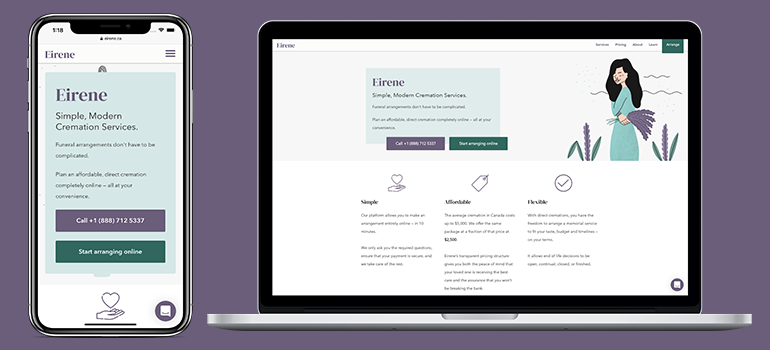The COVID-19 pandemic has led to business transformation across all industries, and funeral services have certainly had to evolve.
Earlier this month, an online cremation and end-of-life technology platform, Eirene.ca, became available within the Greater Toronto Area of Toronto. Eirene.ca provides a more affordable, efficient and transparent cremation service for people wanting alternatives to traditional funeral and burial services. The first of its kind in Canada, Eirene.ca offers to help Canadians navigate through the complexities of end-of-life planning at half the cost offered at traditional funeral homes. Eirene.ca is licensed by the Bereavement Authority of Ontario (BAO).
The Pandemic

Mallory Greene
Mallory Greene, Eirene.ca CEO, explained, “When the pandemic started, municipalities worked quickly to move some services online like issuing medical certificates of death or registering burial permits. But despite best efforts, many other aspects of holding a funeral and burying a loved one became much more complicated.”
Added Greene, “Families, who often hadn’t had conversations around wishes, were asked to make prompt decisions for burial or cremation. Arrangements had to be made over the phone and families were asked to fax documents to funeral homes. Visitations were often not possible outside of immediate family. And Canadians already grieving were unable to celebrate their loved one’s life in a manner befitting them.”
“By offering cremation arrangement services online, Eirene.ca has changed the archaic process that currently exists for grieving families,” stated Greene.
“We arrange the paperwork, cremation and delivery (or pickup) of the ashes in a way that reduces the amount of effort, decision-making and budgeting often associated with traditional funeral-burials,” shared Greene. “This managed service means fewer exposure risks in the process and a more cost-effective method. It also means that families can choose a final resting ceremony of their choosing and at a time that makes sense for the family during the pandemic.”
Cultural & Social Factors
I asked Greene to elaborate on cultural factors and implications related to cremation services. Greene responded, “In Canada and around the world, our culture is evolving along with religious guidelines for end-of-life ritual. We’re seeing many religions and communities change their attitudes in regards to cremation including Buddhism, Judaism and Catholicism.”
“In 2016 for example,” Greene added, “the Pope supported cremation but outlined ashes to be kept in a Church-approved location. In Buddhism cremation is accepted with ashes enshrined or often scattered in a body of water.”
“With more than 70% of Canadians now choosing cremation, we wanted to make it easier for Canadians to arrange the service at a time when they are focused on their family and loved ones.”
Added Greene, “Cremation is an increasingly preferred choice for non-denominational communities, families that live further apart, and as a more affordable choice when compared to a burial.”
Cremation also fulfills, she explained, “the desire to customize end-of-life rituals celebrating someone’s life at their most cherished places. With the pandemic of 2020, cremation became the practical approach at a time when it wasn’t possible to host community funerals, hold visitations, and in some cases even bury the deceased.”
I also asked Greene about her professional background and the research she undertook to create Eirene.ca.
“My family is in healthcare and the funeral industry so it’s a subject matter I’m quite familiar with and care about,” began Greene. “We aren’t good at discussing death in our culture and yet if we did, we’d have more understanding and compassion built into the services and support systems once that day comes.
“My work at Wealthsimple gave me a unique purview of what it takes to disrupt an industry, and when I decided to build my own company, I knew which industry I’d tackle and am glad to have their support.”
Greene also shed some light on what it is like to be a woman in her industry. “Like many industries,” Greene said, “the funeral industry has historically been dominated by men. Thankfully this is changing, and technology can be a great equalizer (if built by the right person). We’re seeing technology-forward services like afterword.co, Willful and Eirene.ca, all led by women, taking on an industry where compassion is a critical part of the user experience – one much needed at a hard time in one’s life.”
In September 2020, Greene undertook end-of-life planning research, involving responses from 1,500 Canadians. Greene discovered that “attitudes around cremation and the industry are shifting.” This research revealed:
- Only 32% of Canadians trust the funeral industry today;
- People are increasingly budget conscious with more than 50% of Canadians; unprepared for the expense of traditional funerals, which on average is north of $8,000;
- More than 50% of respondents indicated they would be comfortable arranging a cremation online;
- Traditional funerals are not always the preferred approach with over 70% of Canadians selecting cremation.”
Greene elaborated, “Additional research shows that we are approaching a historic spike in deaths around the world. Over 2 million Canadians will reach the life expectancy age of 82 by 2040.” More broadly, Green also shared, “The majority of North Americans are choosing to be cremated, and that number is increasing. The cremation rate surpassed 50 percent in 2016 and it is expected to rise to 80 percent by 2035. In 2018, the [Canadian] national cremation rate was at 72.1 percent.
Added Greene, “the world is becoming more secular and agnostic and formal religions are not handling as many of our deaths as they used to. Cremation has generally become more culturally acceptable. The proportion of people age 40 and older who feel it is important to have a religious aspect as part of a funeral has declined, to 35 percent in 2019 from about half in 2012.
Many Canadians do not necessarily identify with a religion and those who do, and the rituals associated with death are changing. Some of the prominent religions like Hinduism, Sikh and Buddhism all prefer cremation, and integrate ceremony and ritual into that arrangement.
We recognize that there are rituals that pertain to specific religions and cultures, and we’d love to expand our offerings to ensure that we can offer packages that reflect the beautiful diversity of Canada” .




